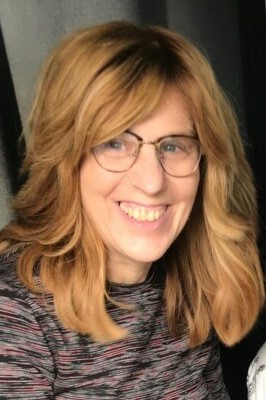Still Growing

Women are returning to the classroom decades after leaving it, and this time, the learning is leading them to the ultimate goal: a rich relationship with their Creator and themselves

Many frum women grew up with the concept that their exclusive identity is that of wife and mother. And for most women, for an extended period, that was their primary role.
“But what happens when the children grow up?” asks Mrs. Esther Wein, an internationally recognized educator and lecturer for 35 years. “Some women get depressed when they realize the mothering phase of their life is over. They wonder: Who am I? In their minds, they have no identity anymore.”
These women may have lost focus of the fact that, in addition to their role as wife and mother, they also have a responsibility to their own souls. Mrs. Wein shares a phone call she recently received from a 38-year-old woman with a large family who, because of medical issues, was unable to have more children and was pained over her new status.
When she probed, Mrs. Wein discovered that this woman saw her value only as a mother. It seemed the real reason she wanted to have more children was to avoid facing the inevitable, painful question, “If I’m not a mother, then who am I?”
Another mother, Mrs. Wein continues, said she only felt appreciated and accomplished when she was caring for her small children. When her youngest was in high school, she felt lost.
“This isn’t healthy,” contends Mrs. Wein. “These women are failing to realize that who they are as individuals in relation to Hashem — not in relation to their children, husband, or community — is their intrinsic role in this world.”
In some societies, women turn to face-lifts to hold onto youth; in ours, it may be mommying forever. Or perhaps our difficulty separating our perception of ourselves from our role as a mother is due to the belief that mommying is the ticket to a box seat in the World to Come.
Which it’s not.
Regardless of the blessings of marriage and children, “The work of a lifetime,” Mrs. Yael Kaisman, veteran teacher, speaker, and life coach, stresses, “is our avodas haneshamah, the cultivation of our souls. And that’s accomplished through Torah, avodah (prayer), and gemilus chasadim.”
Although we have to do all three, people are often naturally drawn to one of those aspects. “Some women’s souls get charged by doing chesed, others find their passion in reciting Tehillim and tefillah, while others find the way to express the energies of their soul is through daas Eloki, gaining knowledge of G-d by learning His Torah,” she continues.
At each juncture of life, our attachment to Hashem comes through the different roles that we play. All stages are important, and women attain different levels of understanding at each one. “But, as previous, more externalized roles fade away,” maintains Esther, “our role generally becomes more internal.”
So what better time to embrace building our own identity than when the children have left the nest? Instead of mourning that our children no longer need us as intensely as when they were little — which can fool us into believing we have nothing to offer — we can view this time as a gift: “The gift of building our inner selves and our connection with Hashem,” in Esther’s words.
“The Rambam says that the goal of every Jew should be to know Hashem,” says Mrs. Wein. “Reaching this goal takes time and effort. Now is the time to put in the effort.”
Another Track
Each of us is multi-faceted, and each facet has a distinct voice clamoring to be heard, at different times, in different ways. Finding the right voice at the right time and listening to it is the key to discovering our true identity, and from there, doing our soul work.
Even during the many years she was consumed with raising her family, Ruchie, a 70-year-old chassidishe mother of a large brood in Boro Park, concedes she felt a little empty. “My husband would tell me raising your children is your Kodesh Hakodoshim.”
While Ruchie acknowledges that this was certainly true, after she married off her youngest, the feeling of emptiness inside grew too big to ignore. “I loved every minute of raising my children, but after they were grown, I realized I wanted to go to shiurim and spend time learning things for my own development and not just what I needed to know for other people’s growth.”
Malka, 61, a science teacher and mother of a large family, was always involved in Torah learning. “I’ve mostly attended hashkafah classes, but I love to learn almost anything Torah related,” she shares. “Even when I had small children at home, I’d arrange for a babysitter so I could go out to a shiur. Learning has always been part of my life, and I can’t imagine my life without it.”
Unlike Malka, however, many women put their learning on hold, or even away forever, once they enter the child-rearing phase. Even for women who do keep up with classes, for those in the thick of childrearing, usually the classes they attend focus solely on parenting or shalom bayis topics. They’re looking for techniques, inspiration, and ways to understand their children better. Classes for their own edification or personal growth are usually not part of their lives.
Sarah, 65, a physical therapist and mother of a grown family, confides that she was one of those women who thought her mothering role was the totality of who she was. She credits her present teachers for redirecting her on her new life’s path.
“I was on the ‘do’ track when I was younger, rather than on the internal expansion track,” she shares. “The classes I went to were never about my own emotional or spiritual development. I was also shallower then. My challenges have made me a deeper person and opened me up to learning I couldn’t have absorbed when I was younger. I not only have the time now, but I have the headspace. And not just headspace, but because of my life experiences, I’m more developed and ready to hear new messages.”
For many years, the only voices Sarah heard were her children’s. And they were her greatest challenge. “I had to learn that children are not here to be our nachas machines; they have minds of their own.” The concept of acceptance — what that word even means — and “Where is Hashem in all this?” were some of the many questions that exploded into Sarah’s consciousness.
“It started a ruckus inside of me. I realized I needed to explore what it means to be a parent, to be a link, and that ultimately led to my work today: Who am I and what does Hashem want from me, especially now that the main parenting phase is finished? My inner work is more important to me now than ever,” she continues. “I’m semi-retired. I still make meals and clean the house, but I don’t feel that’s my life’s mission. And I don’t want to be the mother who lives vicariously through her children. If I wasn’t keeping up with my learning, I’d probably be somewhat depressed.”
While Sarah’s focus today is on her self-development, Malka sees a different running theme in her life. “I’ve always been drawn to learning about emunah,” she says, “and what I’m noticing now is that the emunah lessons I heard at 30 are actually sinking in at 60.
“For example, when I was younger and something didn’t go my way, I’d mouth the right words, but inside I’d get upset. Now, when something happens that’s disturbing, I can say that’s what Hashem wanted — and believe it. I also find I need those tools more than ever because as I age, so do the people around me. There’s more sickness and death.”
“Classes and lectures today reach women at a deeper level than when they were younger and more absorbed in other responsibilities,” shares Mrs. Kaisman. “A lot of women tell me that when they were younger, the Chumash they learned didn’t feel relevant to their lives. It was more that they went to school and learned because that was what they were supposed to do. ‘I didn’t know it could also nourish me,’ they say.”
“When I began studying 15 years ago,” says Ruchie, “I felt like Rabi Akiva. We both started late.” Today, Ruchie almost never misses her daily class. “Recently, I went shopping with my daughters, and, in the middle of the mall, I sat on a bench, pulled out my phone, and said, ‘For the next hour I’m not available, I have my shiur.’ ”
There is a plethora of learning opportunities available today. One can access shiurim virtually 24 hours a day. There are also programs such as the Aish HaTorah learning mission that flies groups of women to Israel to learn with and teach those less knowledgeable. Women get tremendous inspiration from these trips.
“Now that I no longer have small children at home, I have the flexibility to take care of myself, to learn and to teach others,” shares Dina, an annual Aish HaTorah learning mission participant. “The trip is so inspirational; it fuels my whole year.”
But what about our alte bubbas who didn’t spend their time taking Torah classes? Were they any less frum than we are? For the most part, believes Rebbetzin Shifra Fried, rebbetzin of Young Israel of Bedford Bay in Brooklyn, the question is irrelevant.
“Women of yesteryear were wonderful,” she stresses, “but most of them weren’t able to learn, whether because they didn’t have the time or the opportunities weren’t available. Today we have time. And we have huge spiritual challenges. What are we going to do? Play Mahjong? Torah is our connection to Hashem. Learning opens the mind. If you want to keep growing, you need to learn.”
A Different Emphasis
Many women over 50 grew up learning to be loyal soldiers in Hashem’s army. Follow Hashem’s commandments. Do His mitzvos. While these are vital and true concepts, the idea of who they are as individuals in their service of Hashem, and their unique mission in the world, is often missing. The idea of the centrality of the self isn’t in their lexicon. Mrs. Wein will invite these older students to discover their inner world, to embrace their right to experience themselves.
“I definitely grew up with the idea of a wrathful G-d,” shares Miriam, 57, of Flatbush. “I was a typical teenager with acne, and I still remember my halachah teacher telling us that if we popped our pimples on Shabbos, we would go to Gehinnom.” That didn’t stop her from popping them, she shared, but definitely turned her off for many years from further learning.
“Occasionally,” Mrs. Wein shares, “older students will become agitated when learning new ideas. They’re not used to this kind of conversation. I invite them not to be defensive. I try to get them comfortable with the concept of self-expression and identity.”
In today’s generation, she explains, it’s neither helpful nor true to teach that human beings are insignificant, that our job is to “keep Hashem happy” so that we can get a reward or avoid punishment.
Sarah admits that when she went back to learning, she was drawn to the speakers and teachers who talked about Hashem’s love. “I was thirsty to hear these concepts. As much as part of me was skeptical. I was open to it, and because I was open, I found the sources for this approach.
“In the beginning, I heard sources like Rebbe Nachman and Rav Levi Yitzchak of Berditchev. I remember thinking, ‘Okay, I always knew that was their shitah.’ But I wasn’t hearing it from the more traditional sources. It felt a little like Torah for the at-risk teen, so, though I liked it, I still maintained some skepticism.
“As time goes on, though, I’ve been hearing these concepts spoken about even within the very yeshivish world. I’ve been hearing it in a way that’s sitting well in my heart and in my brain, and I’ve embraced it. But it wasn’t a totally smooth transition.”
In our current culture, popular songs abound about Hashem’s love; children are taught from a young age that Hashem wants to hear from us, His tayere kinder. In the yeshivahs of the previous century, that wasn’t always the message students received.
Rebbetzin Fried shares how her teaching has evolved over the years. “I was never the fire and brimstone speaker, I’d say more ‘meat and potatoes’ — this is what you have to do, this is the right thing to do. Today I focus much more on the ahavas Hashem aspect of serving Hashem, I’m gentler and softer and talk about the relationship more. This is what resonates with my students and motivates them to grow. And it works for me too!”
For over 20 years, a group of Lakewood women have been meeting over the phone every Wednesday morning to learn with Rebbetzin Temi Kaminetsky. They’ve gone through many seforim, and in all of them, she never wavers from her theme — the idea that Hashem loves us.
“I remember when I first heard her talk about Hashem loving us,” shares Malka, “I felt like someone was wrapping me up in a comforting blanket. It wasn’t something I was used to hearing.”
“The concept of dveikus (connection) wasn’t taught as much years ago,” Mrs. Kaisman echoes. “Girls were mainly taught how to be responsible Jews. Today’s women crave emotional connection with Hashem. Similar to marriages in former eras, when the focus was on doing the right thing and being responsible and loyal to your spouse, now there’s greater focus on and expectation of having a deeply connected relationship as well.”
Multiple Perks
Torah learning provides women with a deeper connection to Hashem along with feelings of accomplishment in their newfound Torah knowledge. It also sharpens the mind. And attending classes can bring new social connections; regulars often develop close friendships with fellow attendees.
“I credit all the shiurim I’ve gone to over the last 15 years for my gorgeous social life today,” says Ruchie. “Even with the COVID Zoom classes, I’ve made new friends.”
Malka agrees. “I feel good when I’m around people who want to grow,” she says. “Other people may like to talk about the latest styles, but that’s not me. I’m surrounded by women constantly working on their challenges and growing, and I love it.”
Learning that there are different ways to serve Hashem and learning to appreciate people for who they are, despite their differences in behavior and thought, is often another benefit to taking Torah classes.
“Judgement is out the window now,” Ruchie shares. “I still have not gotten a certificate from Hashem stating that only my way of doing things is right. I do what I do because I was brought up that way. But who knows whose way is better?”
Leah, 58, bookkeeper, mother, and grandmother, admits that her learning today is what gives her chiyus. “My avodas Hashem has reached new levels that I couldn’t hope to attain as a busy, hands-on mother. Learning has totally reframed my life. I’m now taking a coaching course based on Torah principles and planning a whole new career all centered around avodas Hashem. Not only that, but I feel my learning has even made me a more effective grandparent.”
The main thing, Mrs. Wein stresses, is not to waste our later life stages. “Try to build your inner world, and don’t be afraid to let go of old roles. There’s a whole world inside of you.”
“For me,” says Sarah, “my learning now is about how to look back at my life and how to look forward: Who am I and where do I want to go? What does making your mark in this world mean? Does it have to be a grandiose accomplishment or are small steps good enough?”
Leah maintains that her learning has dramatically changed her, and, as a result, her relationships as well. “My 20-something daughter went off the derech a few years ago. If I didn’t have the learning and growth and newfound self-confidence, I couldn’t have handled this difficult situation in the appropriate way. I’ve gained confidence and purpose in my life. I feel I have what to give to the world because of what I’ve learned, and I have a greater, constant evolving connection with Hashem.”
“This is what we’re here for,” asserts Mrs. Wein. “We must grab the opportunity to learn who we are while we can.”
(Originally featured in Family First, Issue 750)
Oops! We could not locate your form.






